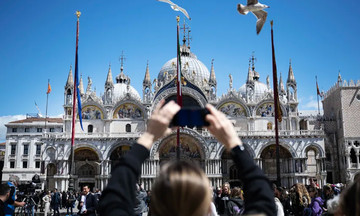Tattoos are increasingly common worldwide, but not all cultures embrace this art form. Some countries have restrictive policies regarding tattoos, and their citizens may not be welcoming to visitors with visible body art. The following are 7 such countries, as advised by The Travel, a prominent Canadian travel website.
The Travel, based in Canada, specializes in providing information on unique and lesser-known destinations and wildlife.
Saudi Arabia
Sunni Islam is the official religion of Saudi Arabia, and its legal system is based on Islamic Sharia law. Under Sharia, tattoos are haram (forbidden or unlawful), making having tattoos inappropriate. If your tattoos aren't on your face or hands, travel agencies recommend covering them in public places.
UAE
While some areas in the UAE, such as Bahrain and Dubai, are more relaxed than Saudi Arabia, that doesn't mean they've adopted Western views on tattoos. Tattooing isn't illegal but is still considered "self-mutilation" under Islamic law and viewed as immoral.
 |
Camel riding experience in Dubai. Photo: King's Business School |
Camel riding experience in Dubai. Photo: King's Business School
Tourists won't be deported from the UAE for having tattoos. However, those with tattoos on their face or hands are often denied entry to buildings like mosques or other religious sites. Therefore, research the do's and don'ts when traveling in the Middle East to understand how to dress and behave in public.
Additionally, most companies in the region won't hire people with visible tattoos. If you have tattoos and are seeking employment in a place like Dubai, tattoo removal is your first step.
Iran
Not all tattoos are prohibited in Iran, but some may be considered offensive.
In 2018, some politicians wanted to ban tattooing completely, but recent regulations have become more flexible. Therefore, tattooing – though considered haram – isn't entirely banned as long as the tattoos aren't offensive, such as anti-Islamic symbols.
Views on tattoos also differ between Sunni and Shia Muslims. Some believe religious tattoos demonstrating faith aren't haram. However, when traveling through any Islamic country, it's best to cover tattooed areas.
Turkey
Turkey doesn't prohibit tattoos, and students in many schools now have tattoos and piercings. However, public opinion on tattoos remains strong, so visitors should cover their tattoos when visiting sacred sites like the Hagia Sophia and the Blue Mosque.
Sri Lanka
Sri Lanka is a beautiful tropical paradise to visit, as long as you don't have Buddhist tattoos. This nation reveres Buddhism, so tattooing Buddhist symbols or images is strictly forbidden. Having such tattoos could lead to deportation or other problems.
In 2014, a British nurse was deported from Sri Lanka for a Buddha tattoo on her arm. Other tattoos aren't an issue.
 |
The famous train to Ella in Sri Lanka. Photo: Lonely Planet |
The famous train to Ella in Sri Lanka. Photo: Lonely Planet
Myanmar
Like Sri Lanka, Myanmar is a devoutly Buddhist country and takes its official religion very seriously. Tattooing is common in many parts of the country, but tattooing Buddhist symbols – especially images of Buddha's head – is considered extremely offensive.
In 2016, a Spanish tourist with a Buddha tattoo on his leg was deported after monks noticed it and informed the Bagan police.
Japan
Japan won't deny entry to people with tattoos, but visitors should be prepared to be turned away from some public areas and attractions. Beaches, public pools, hot springs, saunas, and spas often prohibit visible tattoos.
 |
A person with a full back tattoo in Japan. Photo: Foxxy |
A person with a full back tattoo in Japan. Photo: Foxxy
Traditionally, tattoos in Japan are associated with the Yakuza, the country's organized crime groups. Consequently, public spaces often ban people with tattoos to avoid causing anxiety or offense to other patrons or potential violence.
Hoai Anh (From The Travel)












